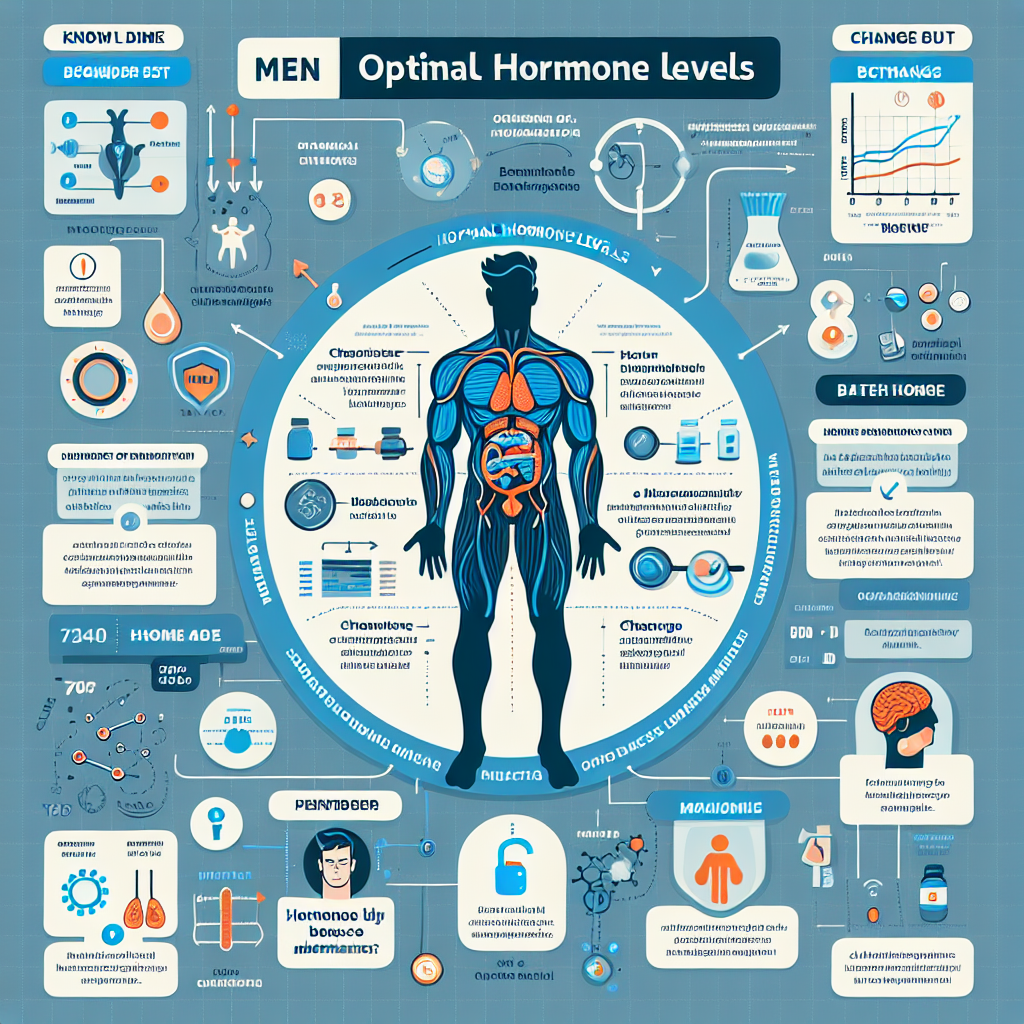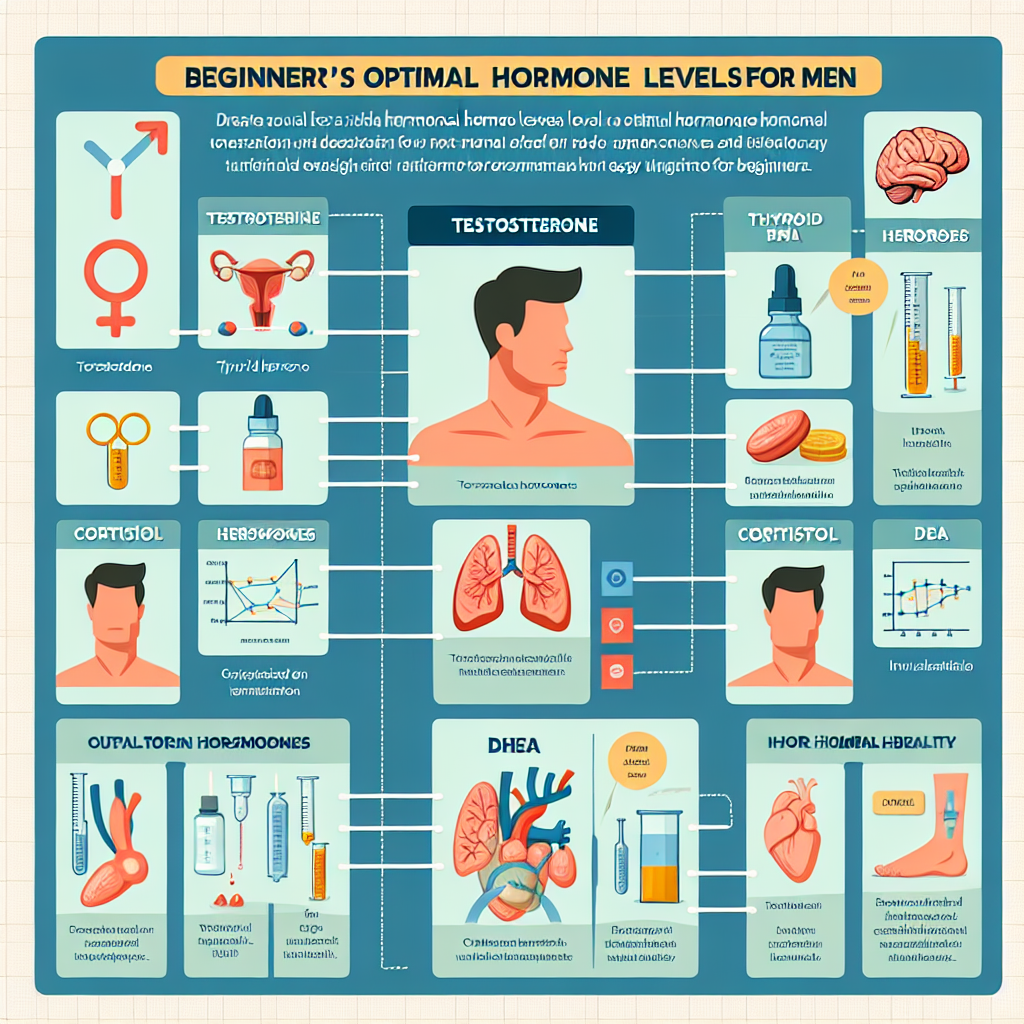Beginner’s Guide to Optimal Hormone Levels For Men

Discover the secrets to achieving optimal hormone levels with our Beginner’s Guide for Men. Learn how to balance your hormones and enhance your overall health. Start your journey to vibrant vitality today!
Understanding the Basics: A Beginner’s Guide to Optimal Hormone Levels for Men
Understanding the basics of optimal hormone levels for men is a crucial aspect of maintaining overall health and well-being. Hormones, the body’s chemical messengers, play a pivotal role in regulating numerous bodily functions, including metabolism, mood, growth, and sexual function. For men, maintaining optimal hormone levels is not just about feeling good; it’s about preventing chronic diseases, enhancing physical performance, and promoting longevity.
Testosterone, the primary male sex hormone, is often the first hormone that comes to mind when discussing men’s health. It is responsible for the development of male reproductive tissues, the promotion of secondary sexual characteristics, and the maintenance of muscle mass and bone density. However, testosterone is not the only hormone that men should be concerned about. Other hormones, such as cortisol, insulin, thyroid hormones, and human growth hormone (HGH), also play significant roles in men’s health.
Cortisol, often referred to as the “stress hormone,” helps the body respond to stress. While it is essential for survival, chronic high levels of cortisol can lead to various health problems, including weight gain, high blood pressure, and a weakened immune system. On the other hand, insulin regulates the body’s blood sugar levels, and imbalances can lead to conditions like diabetes. Thyroid hormones regulate the body’s metabolism, and imbalances can lead to weight gain or loss, fatigue, and depression. Lastly, HGH promotes cell regeneration and growth, playing a crucial role in maintaining healthy tissues, including brain and other vital organs.
Understanding these hormones and their functions is the first step towards achieving optimal hormone levels. The next step is to know the signs of hormonal imbalances. Low testosterone levels in men can lead to symptoms such as fatigue, depression, decreased muscle mass, and low libido. High cortisol levels can cause symptoms like weight gain, high blood pressure, and difficulty sleeping. Insulin imbalances can lead to increased thirst and hunger, frequent urination, and weight loss or gain. Symptoms of thyroid hormone imbalances can include fatigue, weight gain or loss, and mood changes.
Once you understand the basics of hormones and their functions, it’s essential to know how to maintain optimal hormone levels. A healthy lifestyle is the foundation of hormonal balance. Regular exercise, a balanced diet, adequate sleep, and stress management are all crucial for maintaining optimal hormone levels. Regular exercise, for instance, can help boost testosterone levels, improve insulin sensitivity, and reduce cortisol levels. A balanced diet rich in lean proteins, healthy fats, and complex carbohydrates can help regulate insulin and cortisol levels. Adequate sleep is essential for the production of several hormones, including testosterone and HGH. Lastly, stress management techniques, such as meditation and yoga, can help lower cortisol levels.
In addition to lifestyle changes, regular check-ups with a healthcare provider are also essential. Hormone levels can be measured through blood tests, and these tests can help identify any imbalances. If imbalances are detected, a healthcare provider can recommend appropriate treatment options, which may include hormone replacement therapy or medication.
In conclusion, understanding the basics of optimal hormone levels for men is a crucial aspect of maintaining overall health and well-being. By understanding the functions of different hormones, recognizing the signs of hormonal imbalances, and adopting a healthy lifestyle, men can take control of their hormonal health and improve their quality of life.
Navigating Hormonal Health: A Comprehensive Guide for Men

Navigating the complex world of hormonal health can be a daunting task for many men. Hormones play a crucial role in our bodies, regulating everything from mood and energy levels to muscle growth and sexual function. Understanding how to maintain optimal hormone levels is essential for overall health and well-being. This article serves as a beginner’s guide to optimal hormone levels for men, providing a comprehensive overview of the subject.
Hormones are chemical messengers that travel through the bloodstream to tissues and organs, influencing a wide range of bodily functions. In men, the primary hormones are testosterone, cortisol, insulin, and human growth hormone (HGH). Each of these hormones plays a unique role in maintaining health and vitality.
Testosterone, often referred to as the ‘male hormone’, is responsible for the development of male characteristics such as muscle mass, bone density, and body hair. It also plays a significant role in mood, energy levels, and sexual function. Low testosterone levels can lead to symptoms such as fatigue, depression, decreased libido, and loss of muscle mass.
Cortisol, also known as the ‘stress hormone’, helps the body respond to stress. While it’s essential in small amounts, chronic high levels of cortisol can lead to weight gain, sleep problems, and a weakened immune system.
Insulin is a hormone that regulates blood sugar levels. It allows cells to take in glucose from the bloodstream for energy. Insulin resistance, a condition where cells become less responsive to insulin, can lead to type 2 diabetes and other health problems.
Human growth hormone (HGH) is produced by the pituitary gland and plays a key role in growth, body composition, cell repair, and metabolism. Low levels of HGH can result in decreased muscle mass, increased body fat, and reduced physical performance.
Maintaining optimal hormone levels involves a combination of a healthy diet, regular exercise, adequate sleep, and stress management. A diet rich in lean proteins, fruits, vegetables, and healthy fats can help regulate hormone production. Regular physical activity, particularly resistance and high-intensity interval training, can boost testosterone and HGH levels. Adequate sleep is essential for hormone production, particularly cortisol and HGH. Stress management techniques such as meditation, yoga, and deep breathing can help lower cortisol levels.
It’s also important to note that certain lifestyle factors can negatively impact hormone levels. These include excessive alcohol consumption, smoking, a diet high in processed foods, and chronic stress. Avoiding these risk factors can go a long way in maintaining optimal hormone levels.
Regular check-ups with a healthcare provider are also crucial. Hormone levels can be measured through blood tests, and it’s recommended that men over the age of 40 have their hormone levels checked annually. If hormone imbalances are detected, treatment options can include lifestyle changes, hormone replacement therapy, or medication.
In conclusion, understanding and maintaining optimal hormone levels is a vital aspect of men’s health. It requires a holistic approach that includes a healthy diet, regular exercise, adequate sleep, stress management, and regular check-ups. By taking proactive steps towards hormonal health, men can enhance their overall well-being and quality of life.
Achieving Balance: A Beginner’s Guide to Maintaining Optimal Hormone Levels for Men
Achieving a balanced hormonal state is a crucial aspect of maintaining optimal health for men. Hormones, the body’s chemical messengers, play a pivotal role in regulating numerous physiological processes, including metabolism, mood, growth, and sexual function. However, hormonal imbalances can lead to a myriad of health issues, ranging from fatigue and weight gain to decreased libido and mood disorders. Therefore, understanding how to maintain optimal hormone levels is essential for men seeking to enhance their overall well-being.
Firstly, it’s important to understand the key hormones that significantly impact men’s health. Testosterone, the primary male sex hormone, is responsible for developing and maintaining masculine characteristics. It also plays a crucial role in bone density, muscle mass, and red blood cell production. Another vital hormone is cortisol, often referred to as the ‘stress hormone.’ While cortisol is essential for survival, chronic high levels can lead to weight gain, sleep disturbances, and a weakened immune system. Insulin, a hormone that regulates blood sugar levels, is also critical. Insulin resistance can lead to obesity and type 2 diabetes.
Achieving optimal hormone levels begins with a healthy lifestyle. Regular physical activity is one of the most effective ways to boost testosterone levels naturally. Resistance and high-intensity interval training (HIIT) have been shown to have the most significant impact. Additionally, regular exercise can help manage cortisol levels, reducing stress and improving sleep quality.
Diet also plays a significant role in hormone health. Consuming a balanced diet rich in lean proteins, fruits, vegetables, and healthy fats can help maintain optimal hormone levels. Specific nutrients, such as zinc and vitamin D, are particularly beneficial for testosterone production. On the other hand, excessive consumption of processed foods and sugars can lead to insulin resistance and hormonal imbalance.
Sleep is another critical factor in hormonal health. Lack of quality sleep can lead to elevated cortisol levels and decreased testosterone production. Therefore, prioritizing good sleep hygiene, including maintaining a consistent sleep schedule and creating a restful sleep environment, is essential.
While lifestyle modifications are the first line of defense in maintaining hormonal balance, sometimes they may not be enough. In such cases, it may be necessary to consider hormone replacement therapy (HRT). HRT involves supplementing the body with hormones to restore balance. However, it’s important to note that HRT should only be considered under the guidance of a healthcare professional, as it can have potential side effects.
Regular check-ups and hormone testing are also crucial in maintaining optimal hormone levels. Hormone levels can fluctuate due to various factors, including age, stress, and underlying health conditions. Regular testing allows for early detection of any imbalances, enabling timely intervention and treatment.
In conclusion, maintaining optimal hormone levels is a multifaceted process that involves a healthy lifestyle, regular check-ups, and, in some cases, medical intervention. By understanding the role of hormones in the body and taking proactive steps to maintain balance, men can significantly enhance their overall health and well-being. Remember, it’s never too early or too late to start taking care of your hormonal health.